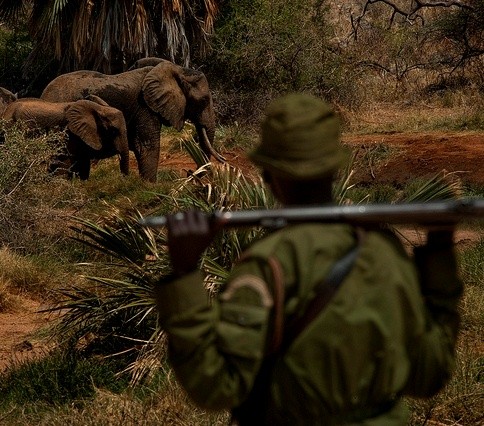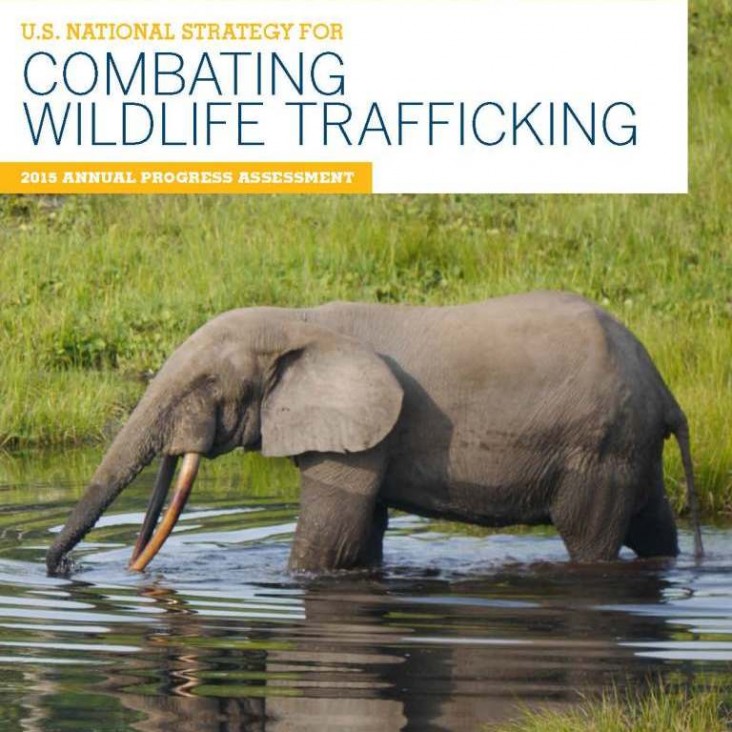- What We Do
- Agriculture and Food Security
- Democracy, Human Rights and Governance
- Economic Growth and Trade
- Education
- Ending Extreme Poverty
- Environment and Global Climate Change
- Global Climate Change
- Conserving Biodiversity and Forests
- Sustainable Urbanization for Global Progress and Security
- Securing Land Tenure and Property Rights for Stability and Prosperity
- Sustainable Land Management
- Environmental Impact Assessment
- Knowledge Management for Environment and Natural Resources
- Sustainable Tourism
- Earth Day
- Gender Equality and Women's Empowerment
- Global Health
- Water and Sanitation
- Working in Crises and Conflict
- U.S. Global Development Lab
What is Wildlife Trafficking?
Wildlife trafficking — poaching and illegal trade in wildlife and wildlife products — is one of the largest black markets in the world, measuring billions of dollars a year. It threatens the survival of iconic species such as elephants, rhinos, tigers, sharks, and sea turtles, as well as the security of nations and regions, economic development, and environmental health. Poachers and traffickers are often linked to international criminal networks that take advantage of weak laws and enforcement, porous borders, and corrupt officials. These networks are violent and sophisticated, operating without concern for the harm they inflict on local communities, or the dangerous groups financed by the sale of wildlife products.
Why does wildlife trafficking matter to USAID?
Wildlife trafficking is an international development issue because it undermines security, rule of law, and our efforts to end extreme poverty. Billions of people around the world rely on forests, wildlife, and fisheries for their livelihoods. When we lose wildlife and security due to violent criminal groups, we lose essential tools in the fight against extreme poverty. The loss of iconic wildlife and the presence of violent elements linked to trafficking reduce prospects for sustainable development, including nature-based tourism and sustainable fisheries. Protecting wildlife from poaching and illegal trafficking helps secure our global heritage and fights against the criminal networks that exploit humans and nature and thereby threaten national security and rule of law.
What is USAID doing to combat wildlife trafficking?
USAID invested more than $67 million in fiscal year 2015 funds, up from $13 million in 2012, in activities to combat wildlife trafficking by fighting poaching, improving enforcement and prosecution, disrupting transit, and reducing consumer demand in Africa and Asia. More than 65 projects in 25 countries advance the National Strategy for Combating Wildlife Trafficking and associated Strategy Implementation Plan, which mobilize resources and coordination to address this important challenge. Recent results of USAID and other U.S. government efforts are highlighted in the 2015 National Strategy Progress Assessment.
We employ a variety of approaches to tackle wildlife crime:
-
Anti-Poaching: Regional training workshops in Central and East Africa introduced and brought to scale the Spatial Monitoring and Reporting Tool (SMART) for making conservation patrols more strategic and accountable. SMART is now an essential component of USAID’s work in Africa, with SMART training and equipment provided to hundreds of government and community rangers in at least a dozen protected areas.
-
Law Enforcement and Prosecution: USAID partners have helped strengthen previously weak wildlife laws in several countries, including Kenya and Mozambique where higher fines and jail times are now helping deter poaching and trafficking. Across Africa, hundreds of rangers, law-enforcement agents, and judicial officials have been trained in techniques to prevent poaching or bring perpetrators of wildlife crime to justice, significantly increasing detection of wildlife crimes and the number of seizures, arrests and prosecutions.
-
Demand Reduction: Since April 2011, campaigns to reduce demand for wildlife products have leveraged $4 million from governmental and private partnerships to reach over 740 million people across Asia through the internet, TV spots, and installations at airports. Our programs are learning what works to change consumer behavior, and how to monitor this change more effectively.
-
Private Sector Partnerships: USAID is partnering with businesses that want to be part of the solution to this crisis. We have worked with Delta Airlines, Kenya Airways and Ethiad Airlines to train employees on how to detect and respond to illegal wildlife and wildlife products on airplanes, and are applying this experience to our new ROUTES partnership with stakeholders in the transportation sector. In the hospitality industry, USAID’s work with Fin Free Thailand has encouraged more than 180 prominent hotels and restaurants to keep shark fin soup off their menus.
-
Innovation: USAID is sourcing innovative science and technology-based solutions to detect transit routes, strengthen forensic evidence, reduce consumer demand, and tackle corruption through our Wildlife Crime Tech Challenge. The Challenge has awarded prizes to the most creative, innovative, and promising solutions to wildlife crime, and is helping put innovations into the hands of individuals and institutions that can use them.

Highlight: How do these approaches work together?
Asia’s Regional Response to Endangered Species Trafficking (ARREST) program is one of USAID’s most comprehensive and successful initiatives in the fight against wildlife trafficking. Drawing on the expertise of the U.S. Fish and Wildlife Service, Department of Justice, Department of State and others, the program reduces consumer demand for illegal products, enhances law enforcement and fortifies cooperation in Asia. ARREST trains park rangers, customs officers, police, and lawyers in wildlife forensics and border inspections as well as tactics for arrests and prosecutions. USAID, through ARREST, works closely with and provides support to the Association of Southeast Asian Nations Wildlife Enforcement Network (ASEAN-WEN), a partnership that has resulted in high profile arrests and convictions of major criminals over the past three years. For example, in early 2014, ASEAN-WEN and a host of partners across 28 African and Asian countries took part in an enforcement operation that resulted in more than 400 arrests and the seizure of 36 rhino horns, more than 3 metric tons of ivory, at least 10,000 turtles, and about 1,000 skins of protected species.









Comment
Make a general inquiry or suggest an improvement.